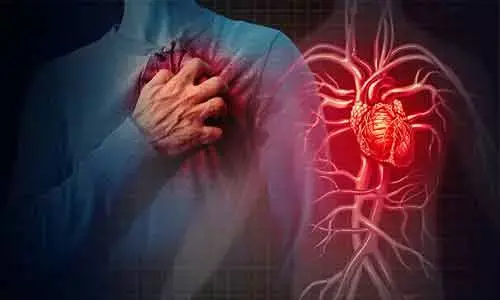- Home
- Medical news & Guidelines
- Anesthesiology
- Cardiology and CTVS
- Critical Care
- Dentistry
- Dermatology
- Diabetes and Endocrinology
- ENT
- Gastroenterology
- Medicine
- Nephrology
- Neurology
- Obstretics-Gynaecology
- Oncology
- Ophthalmology
- Orthopaedics
- Pediatrics-Neonatology
- Psychiatry
- Pulmonology
- Radiology
- Surgery
- Urology
- Laboratory Medicine
- Diet
- Nursing
- Paramedical
- Physiotherapy
- Health news
- Fact Check
- Bone Health Fact Check
- Brain Health Fact Check
- Cancer Related Fact Check
- Child Care Fact Check
- Dental and oral health fact check
- Diabetes and metabolic health fact check
- Diet and Nutrition Fact Check
- Eye and ENT Care Fact Check
- Fitness fact check
- Gut health fact check
- Heart health fact check
- Kidney health fact check
- Medical education fact check
- Men's health fact check
- Respiratory fact check
- Skin and hair care fact check
- Vaccine and Immunization fact check
- Women's health fact check
- AYUSH
- State News
- Andaman and Nicobar Islands
- Andhra Pradesh
- Arunachal Pradesh
- Assam
- Bihar
- Chandigarh
- Chattisgarh
- Dadra and Nagar Haveli
- Daman and Diu
- Delhi
- Goa
- Gujarat
- Haryana
- Himachal Pradesh
- Jammu & Kashmir
- Jharkhand
- Karnataka
- Kerala
- Ladakh
- Lakshadweep
- Madhya Pradesh
- Maharashtra
- Manipur
- Meghalaya
- Mizoram
- Nagaland
- Odisha
- Puducherry
- Punjab
- Rajasthan
- Sikkim
- Tamil Nadu
- Telangana
- Tripura
- Uttar Pradesh
- Uttrakhand
- West Bengal
- Medical Education
- Industry
New MI testing protocol reduces waiting time in ER during Covid 19 pandemic

DALLAS - UT Southwestern Medical Center doctors have developed a new protocol using highly sensitive blood tests to determine whether someone is having a heart attack.This can reduce wait times and overcrowding in emergency departments. This is particularly meaningful during the current coronavirus pandemic when many people with chest pain may be fearful of going to the hospital.
The research has been published online in JAMA Open.
"Patients are more reluctant to come to the ER with heart-related symptoms during the COVID-19 outbreak. We do not want those with medical emergencies to avoid the hospital due to concern for risk from the virus," says cardiologist Rebecca Vigen, M.D., assistant professor of internal medicine at UT Southwestern.
The research team led by Vigen found that a new protocol for using high sensitivity cardiac troponin testing can improve efficiency in the ER by more quickly determining which patients are not having a heart attack. Troponins are proteins released when the heart muscle has been damaged. The protocol incorporates the HEART score - history, electrocardiogram, age, risk factors, and troponin - an emergency department risk assessment tool that guides decisions on discharge and stress testing.
According to the Centers for Disease Control and Prevention, chest pain is the most common reason for trips to the ER, resulting in 7 million annual visits.
"Our innovative strategy allowed us to 'rule out' heart attacks within one hour in more than half of the patients who were tested. This process is safe and improves the efficiency of evaluating patients with possible heart attacks," says James de Lemos, M.D., professor of internal medicine at UT Southwestern and co-author of the study.
"Emergency room overcrowding has become an urgent health priority that is even more pressing in the current COVID-19 pandemic. Given the large size of the study and its performance during routine operations in our county hospital, we think the findings would apply to many busy U.S. emergency rooms," de Lemos adds.
The new protocol was first implemented in December 2017 at Parkland Memorial Hospital, a major safety net hospital in Dallas, and then in October 2018 at UT Southwestern's William P. Clements Jr. University Hospital. The study included 31,543 emergency room patients at Parkland from Jan. 1, 2017, to Oct. 16, 2018. Their mean age was 54, the population was racially and ethnically diverse, and 48 percent were women.
Hina Zahid Joined Medical Dialogue in 2017 with a passion to work as a Reporter. She coordinates with various national and international journals and association and covers all the stories related to Medical guidelines, Medical Journals, rare medical surgeries as well as all the updates in the medical field. Email: editorial@medicaldialogues.in. Contact no. 011-43720751
Dr Kamal Kant Kohli-MBBS, DTCD- a chest specialist with more than 30 years of practice and a flair for writing clinical articles, Dr Kamal Kant Kohli joined Medical Dialogues as a Chief Editor of Medical News. Besides writing articles, as an editor, he proofreads and verifies all the medical content published on Medical Dialogues including those coming from journals, studies,medical conferences,guidelines etc. Email: drkohli@medicaldialogues.in. Contact no. 011-43720751


